优选无灵主语与翻译
- 格式:ppt
- 大小:777.50 KB
- 文档页数:96
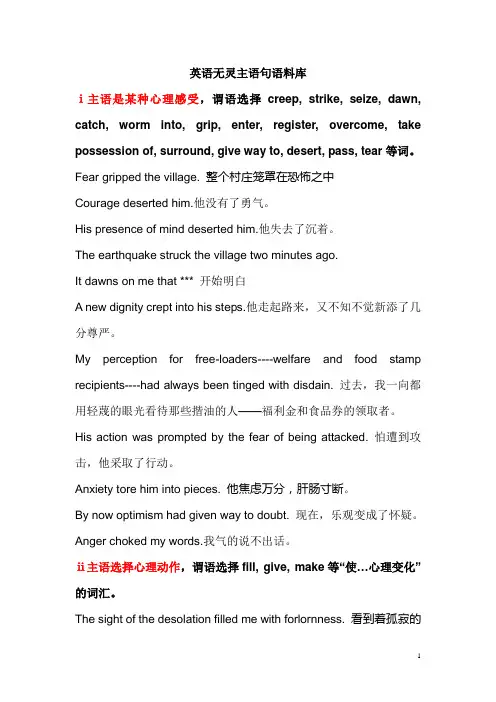
英语无灵主语句语料库ⅰ主语是某种心理感受,谓语选择creep, strike, seize, dawn, catch, worm into, grip, enter, register, overcome, take possession of, surround, give way to, desert, pass, tear等词。
Fear gripped the village. 整个村庄笼罩在恐怖之中Courage deserted him.他没有了勇气。
His presence of mind deserted him.他失去了沉着。
The earthquake struck the village two minutes ago.It dawns on me that *** 开始明白A new dignity crept into his steps.他走起路来,又不知不觉新添了几分尊严。
My perception for free-loaders----welfare and food stamp recipients----had always been tinged with disdain. 过去,我一向都用轻蔑的眼光看待那些揩油的人——福利金和食品券的领取者。
His action was prompted by the fear of being attacked. 怕遭到攻击,他采取了行动。
Anxiety tore him into pieces. 他焦虑万分,肝肠寸断。
By now optimism had given way to doubt. 现在,乐观变成了怀疑。
Anger choked my words.我气的说不出话。
ⅱ主语选择心理动作,谓语选择fill, give, make等“使…心理变化”的词汇。
The sight of the desolation filled me with forlornness. 看到着孤寂的景象,我心中满是凄凉。

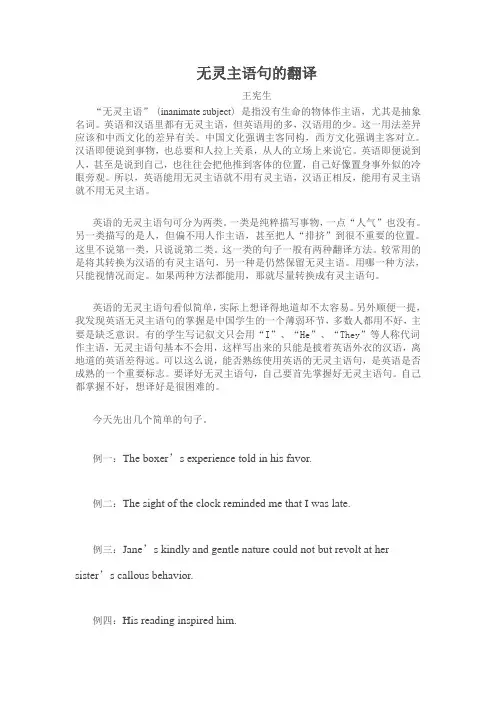
无灵主语句的翻译王宪生“无灵主语” (inanimate subject) 是指没有生命的物体作主语,尤其是抽象名词。
英语和汉语里都有无灵主语,但英语用的多,汉语用的少。
这一用法差异应该和中西文化的差异有关。
中国文化强调主客同构,西方文化强调主客对立。
汉语即便说到事物,也总要和人拉上关系,从人的立场上来说它。
英语即便说到人,甚至是说到自己,也往往会把他推到客体的位置,自己好像置身事外似的冷眼旁观。
所以,英语能用无灵主语就不用有灵主语,汉语正相反,能用有灵主语就不用无灵主语。
英语的无灵主语句可分为两类。
一类是纯粹描写事物,一点“人气”也没有。
另一类描写的是人,但偏不用人作主语,甚至把人“排挤”到很不重要的位置。
这里不说第一类,只说说第二类。
这一类的句子一般有两种翻译方法。
较常用的是将其转换为汉语的有灵主语句,另一种是仍然保留无灵主语。
用哪一种方法,只能视情况而定。
如果两种方法都能用,那就尽量转换成有灵主语句。
英语的无灵主语句看似简单,实际上想译得地道却不太容易。
另外顺便一提,我发现英语无灵主语句的掌握是中国学生的一个薄弱环节,多数人都用不好,主要是缺乏意识。
有的学生写记叙文只会用“I”、“He”、“They”等人称代词作主语,无灵主语句基本不会用,这样写出来的只能是披着英语外衣的汉语,离地道的英语差得远。
可以这么说,能否熟练使用英语的无灵主语句,是英语是否成熟的一个重要标志。
要译好无灵主语句,自己要首先掌握好无灵主语句。
自己都掌握不好,想译好是很困难的。
今天先出几个简单的句子。
例一:The boxer’s experience told in his favor.例二:The sight of the clock reminded me that I was late.例三:Jane’s kindly and gentle nature could not but revolt at her sister’s callous behavior.例四:His reading inspired him.例五:Fortune smiled on him.例六:Aimlessness and failure marked Hitler’s early life.例七:Childhood dearly loves a tale; for its simple heart finds the way out of a reality it does not understand by contriving a world of make-believe.A Research on the International Competitive Power of Transportation Service Exports from Guangdong ProvinceAbstract: Guangdong, as the largest import and export trading power in China, has seen further expansion in international trade in the 21st century, especially after China became a member country of WTO. Since the 90's of the last century, with the rapid development of information technology, transportation service exports has been flourishing globally. Guangdong, being one of the forerunners in Chinese economic reform, shows the state of affairs in the field of international transportation exports.Based on the analysis of development status of transportation service exports from Guangdong, of the necessity of tapping into transportation service exports, of the international competitive power and competitive edge of Guangdong in the field of transportation service exports, I putforward the strategy of improving the international competitive power of Guangdong in transportation service exports.Keywords: Guangdong Province, transportation service, service exports, international competitive power。
![无灵主语句[整理版]](https://uimg.taocdn.com/4771b952f08583d049649b6648d7c1c708a10bd8.webp)
英语无灵主语句一.主语是情感状态的抽象名词谓语选择如:creep, strike, seize, dawn, catch, worm into, grip, enter, register, overcome, take possession of, surround, give way to, desert, pass, tear 等词。
1. Fear gripped the village. 整个村庄笼罩在恐怖之中。
2. Courage deserted him. 他没有了勇气。
3. His presence of mind deserted him. 他失去了沉着。
4. The earthquake struck the village two minutes ago.5. A new dignity crept into his steps. 他走起路来,不知不觉添了几分尊严。
6. Anxiety tore him into pieces. 他焦虑万分,肝肠寸断。
7. By now optimism had given way to doubt. 现在,乐观变成了怀疑。
8. Anger choked my words. 我气的说不出话。
9. Astonishment deprived me of my power of speech. 我惊讶得说不出话来。
10. Neither sorrow nor regret followed my passionate outburst.我这样发作一通之后,既不难过,也不后悔。
11. A chill of horror suddenly swept over him. 他突然感到不寒而栗。
12. Despair seized him at the thought of her setting out alone to renew theweary quest for work.想起她一个人出去重新登上找工作的艰辛路途,他觉得万念俱灰。
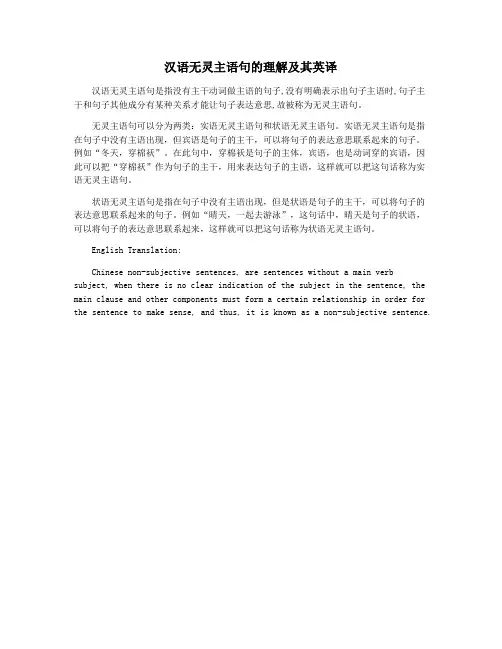
汉语无灵主语句的理解及其英译
汉语无灵主语句是指没有主干动词做主语的句子,没有明确表示出句子主语时,句子主干和句子其他成分有某种关系才能让句子表达意思,故被称为无灵主语句。
无灵主语句可以分为两类:实语无灵主语句和状语无灵主语句。
实语无灵主语句是指在句子中没有主语出现,但宾语是句子的主干,可以将句子的表达意思联系起来的句子。
例如“冬天,穿棉袄”。
在此句中,穿棉袄是句子的主体,宾语,也是动词穿的宾语,因此可以把“穿棉袄”作为句子的主干,用来表达句子的主语,这样就可以把这句话称为实语无灵主语句。
状语无灵主语句是指在句子中没有主语出现,但是状语是句子的主干,可以将句子的表达意思联系起来的句子。
例如“晴天,一起去游泳”,这句话中,晴天是句子的状语,可以将句子的表达意思联系起来,这样就可以把这句话称为状语无灵主语句。
English Translation:
Chinese non-subjective sentences, are sentences without a main verb subject, when there is no clear indication of the subject in the sentence, the main clause and other components must form a certain relationship in order for the sentence to make sense, and thus, it is known as a non-subjective sentence.。


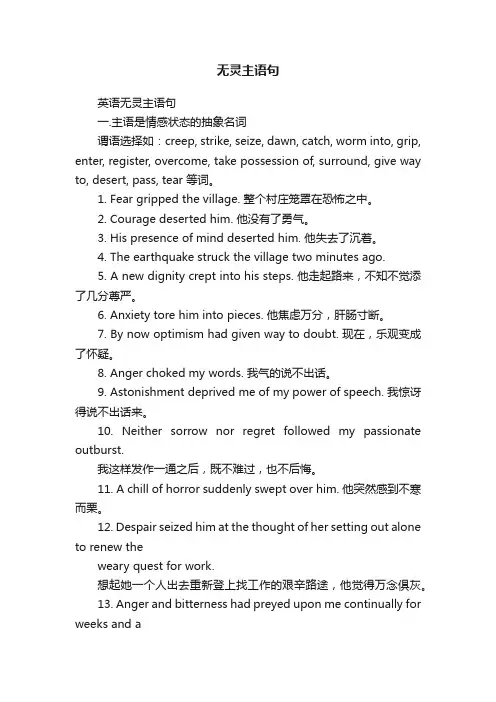
无灵主语句英语无灵主语句一.主语是情感状态的抽象名词谓语选择如:creep, strike, seize, dawn, catch, worm into, grip, enter, register, overcome, take possession of, surround, give way to, desert, pass, tear 等词。
1. Fear gripped the village. 整个村庄笼罩在恐怖之中。
2. Courage deserted him. 他没有了勇气。
3. His presence of mind deserted him. 他失去了沉着。
4. The earthquake struck the village two minutes ago.5. A new dignity crept into his steps. 他走起路来,不知不觉添了几分尊严。
6. Anxiety tore him into pieces. 他焦虑万分,肝肠寸断。
7. By now optimism had given way to doubt. 现在,乐观变成了怀疑。
8. Anger choked my words. 我气的说不出话。
9. Astonishment deprived me of my power of speech. 我惊讶得说不出话来。
10. Neither sorrow nor regret followed my passionate outburst.我这样发作一通之后,既不难过,也不后悔。
11. A chill of horror suddenly swept over him. 他突然感到不寒而栗。
12. Despair seized him at the thought of her setting out alone to renew theweary quest for work.想起她一个人出去重新登上找工作的艰辛路途,他觉得万念俱灰。
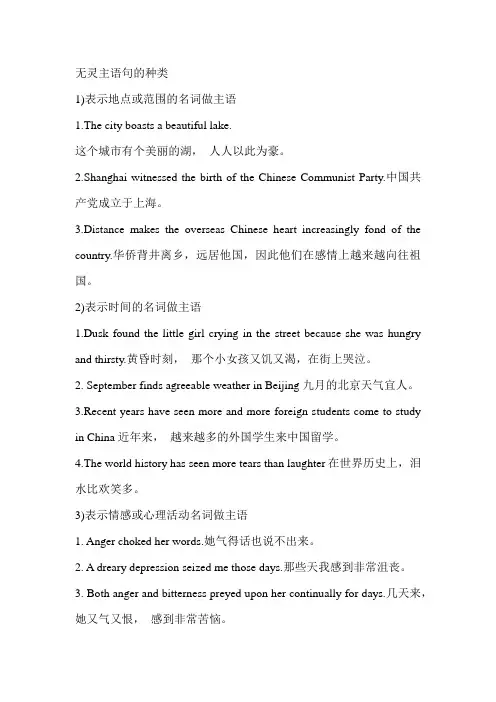
无灵主语句的种类1)表示地点或范围的名词做主语1.The city boasts a beautiful lake.这个城市有个美丽的湖,人人以此为豪。
2.Shanghai witnessed the birth of the Chinese Communist Party.中国共产党成立于上海。
3.Distance makes the overseas Chinese heart increasingly fond of the country.华侨背井离乡,远居他国,因此他们在感情上越来越向往祖国。
2)表示时间的名词做主语1.Dusk found the little girl crying in the street because she was hungry and thirsty.黄昏时刻,那个小女孩又饥又渴,在街上哭泣。
2. September finds agreeable weather in Beijing九月的北京天气宜人。
3.Recent years have seen more and more foreign students come to study in China近年来,越来越多的外国学生来中国留学。
4.The world history has seen more tears than laughter在世界历史上,泪水比欢笑多。
3)表示情感或心理活动名词做主语1. Anger choked her words.她气得话也说不出来。
2. A dreary depression seized me those days.那些天我感到非常沮丧。
3. Both anger and bitterness preyed upon her continually for days.几天来,她又气又恨,感到非常苦恼。
4. Astonishment deprived me of my power of speech.我惊讶地说不出话来。
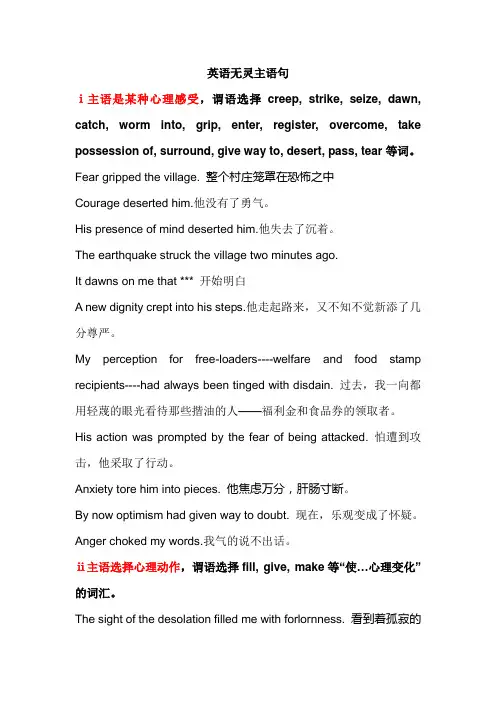
英语无灵主语句ⅰ主语是某种心理感受,谓语选择creep, strike, seize, dawn, catch, worm into, grip, enter, register, overcome, take possession of, surround, give way to, desert, pass, tear等词。
Fear gripped the village. 整个村庄笼罩在恐怖之中Courage deserted him.他没有了勇气。
His presence of mind deserted him.他失去了沉着。
The earthquake struck the village two minutes ago.It dawns on me that *** 开始明白A new dignity crept into his steps.他走起路来,又不知不觉新添了几分尊严。
My perception for free-loaders----welfare and food stamp recipients----had always been tinged with disdain. 过去,我一向都用轻蔑的眼光看待那些揩油的人——福利金和食品券的领取者。
His action was prompted by the fear of being attacked. 怕遭到攻击,他采取了行动。
Anxiety tore him into pieces. 他焦虑万分,肝肠寸断。
By now optimism had given way to doubt. 现在,乐观变成了怀疑。
Anger choked my words.我气的说不出话。
ⅱ主语选择心理动作,谓语选择fill, give, make等“使…心理变化”的词汇。
The sight of the desolation filled me with forlornness. 看到着孤寂的景象,我心中满是凄凉。
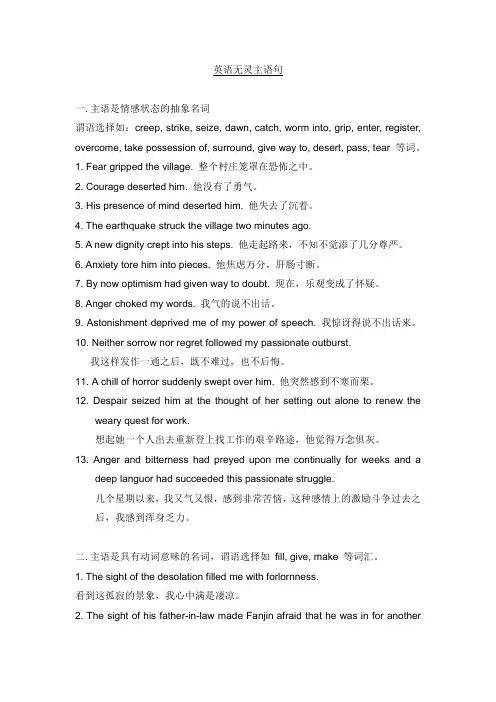
英语无灵主语句一.主语是情感状态的抽象名词谓语选择如:creep, strike, seize, dawn, catch, worm into, grip, enter, register, overcome, take possession of, surround, give way to, desert, pass, tear 等词。
1. Fear gripped the village. 整个村庄笼罩在恐怖之中。
2. Courage deserted him. 他没有了勇气。
3. His presence of mind deserted him. 他失去了沉着。
4. The earthquake struck the village two minutes ago.5. A new dignity crept into his steps. 他走起路来,不知不觉添了几分尊严。
6. Anxiety tore him into pieces. 他焦虑万分,肝肠寸断。
7. By now optimism had given way to doubt. 现在,乐观变成了怀疑。
8. Anger choked my words. 我气的说不出话。
9. Astonishment deprived me of my power of speech. 我惊讶得说不出话来。
10. Neither sorrow nor regret followed my passionate outburst.我这样发作一通之后,既不难过,也不后悔。
11. A chill of horror suddenly swept over him. 他突然感到不寒而栗。
12. Despair seized him at the thought of her setting out alone to renew theweary quest for work.想起她一个人出去重新登上找工作的艰辛路途,他觉得万念俱灰。
高考英语写作无灵主句一、定义无灵主语就是用无生命的事物作主语。
【例句】1.Shock deprived me of my power of speech.我惊讶得说不出话来2.Horror rulled the whole room.恐惧笼罩了整个房间。
3.The past three years witnessed our growth.过去的三年见证了我们的成长综上例句所述,无灵主句=无灵主语+有灵动词(+宾语)这类动词常用的为:看见see 发现find带来bring见证witness 给予give逃离escape 包围surround剥夺deprive提供serve发送赠送send告诉/见证tell允许permit邀请invite拿/带take驱使drive阻止prevent 等二、分类无灵主语共有四类第一类表示的情感/状态名词作主语例句:1.我紧张得说不出话来。
Tension choked my words.2.我心中充满了喜悦。
A thrill of joy flooded me.3.她失去了勇气。
Courage deserted her .【练习】他惊慌失措。
【答案】Panic seized him表情感/状态的常见名词汇总:开心 delight 激动 thrill放松 relaxation 满意 satisfaction震惊 shock 悲伤sorrow绝望desperation沮丧 frustration愤怒 rage焦虑 anxiety疲惫exhaustion恐惧 fear/horror困惑 confusion羞愧shame尴尬embarrassment孤独loneliness第二类表示思考/动作行为的名词作主语例句:我脑子里闪过一个可怕的念头An awful thought struck me.我们爬了50分钟到了山顶。
A 50 minutes' climbing brought us to the top of the mountain. 【练习】看到这个情景使我心中充满了幸福。
读后续写之无灵主语无灵主语句=无灵主语+有灵动词“无灵主语”简单理解就是“没有生命力”的东西做主语。
比如时间,地点,自然现象等。
“有灵动词”简单理解就是把没有生命力的东西,赋予有生命力的动作。
比如I love everybody.译为:我爱大家,→My love goes to everybody.中love就是没有生命力的名词,但是go就是有生命力的动词。
(1)第1个优点:增加主语的多样性。
往往在写作时,我们会反复用同一有生命的词作主语,使语句显得单调,重复。
这些总在不经意之间常常发生。
例如We don’t think so.If we want light,we mustconquer darkness.我们并不这么认为。
如果我们想要光明,我们就必须征服黑暗。
三个we的使用,使句子显得平淡,甚至别扭,但如果稍加变动,句子会显得协调的多。
We don’t think so.If we want light,darkness must be conquered.我们并不这么认为。
如果我们想要光明,黑暗就必须被征服。
(2)第2个优点:增使语言更生动化。
将无生命的事物作主语而展开的句子,往往会用上比喻、拟人等修辞手法,语言随之提升一个档次。
这也就是无灵主语的难点所在,也是华丽之处。
需要注意的是,并不是简单的主动语态变为被动语态,而是用主动语态去表达被动意义。
比如:I forgot his name.我们忘了他的名字了。
并不是简单地变为His name was forgotten by me.而应当更为形象的用主动语态表示。
比如我们可以说:“他的名字溜出了我的大脑。
”His name slipped my mind.“他的名字没有在我头脑中扎根。
”His name didn't take root in my mind.其实要写这样的句子并不难,只要掌握这种思想,加上一段时间的练习,肯定会下笔如有神。
英语无灵主语句一.主语是情感状态的抽象名词谓语选择如:creep, strike, seize, dawn, catch, worm into, grip, enter, register, overcome, take possession of, surround, give way to, desert, pass, tear 等词。
1. Fear gripped the village. 整个村庄笼罩在恐怖之中。
2. Courage deserted him. 他没有了勇气。
3. His presence of mind deserted him. 他失去了沉着。
4. The earthquake struck the village two minutes ago.5. A new dignity crept into his steps. 他走起路来,不知不觉添了几分尊严。
6. Anxiety tore him into pieces. 他焦虑万分,肝肠寸断。
7. By now optimism had given way to doubt. 现在,乐观变成了怀疑。
8. Anger choked my words. 我气的说不出话。
9. Astonishment deprived me of my power of speech. 我惊讶得说不出话来。
10. Neither sorrow nor regret followed my passionate outburst.我这样发作一通之后,既不难过,也不后悔。
11. A chill of horror suddenly swept over him. 他突然感到不寒而栗。
12. Despair seized him at the thought of her setting out alone to renew theweary quest for work.想起她一个人出去重新登上找工作的艰辛路途,他觉得万念俱灰。